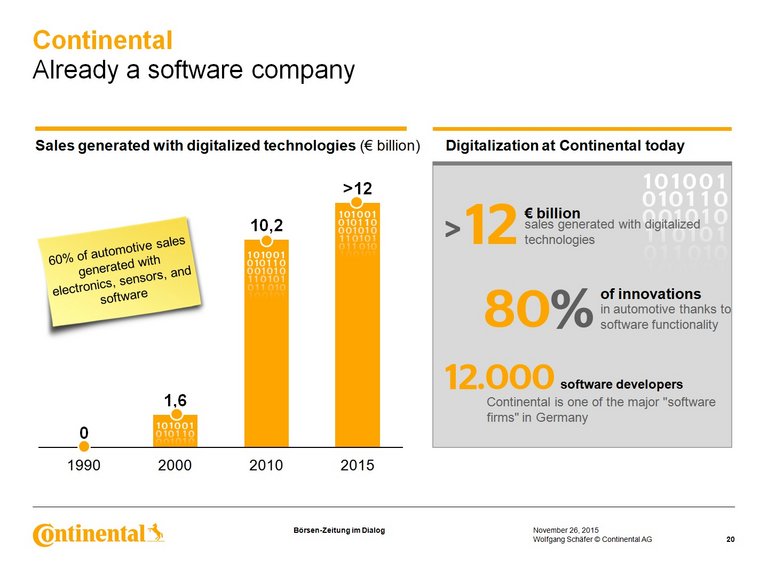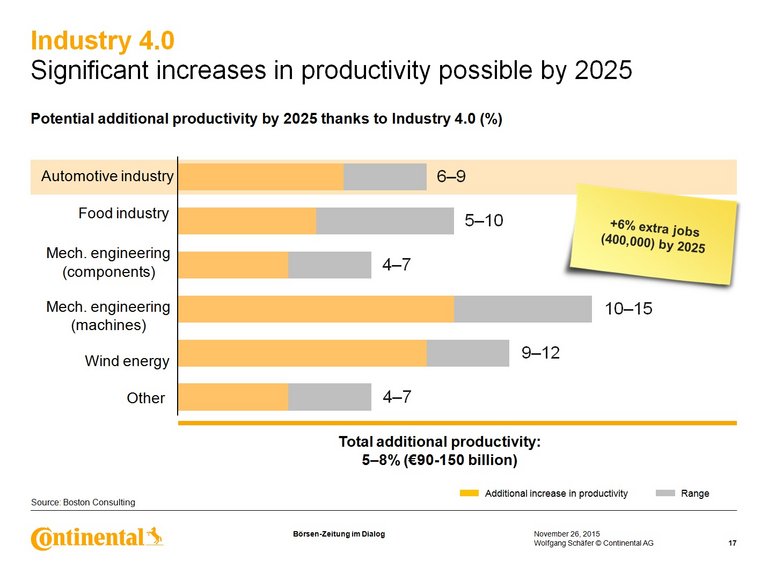Man vs. machine? Self-driving cars and digital factories
Digitalization is a topic that is largely discussed in the automotive industry. In this context, self-driving cars and digital factories are often a particular focus of public interest. In the case of both developments, humans tend to be depicted as the aggrieved party. Yet digitalization is not an end in itself. It promotes prosperity through the development of entire industries and their value chains.
Wolfgang Schäfer exemplified the impact of digitalization on the automotive industry and Continental in particular in his keynote speech “Man vs. machine? Self-driving cars and digital factories” during a media event in Düsseldorf in November 2015.
In his speech “Man vs. machine? Self-driving cars and digital factories” Wolfgang Schäfer focused on the digitization effects on two main aspects:
1. Products:
Technological advancements in the automotive industry heavily depend on software. It is the new wheel of the industry. Digitalization ultimately allows the automotive industry to increasingly develop innovations that promote megatrends.
From a purely mechanical product, the car has now been transformed into a rolling computer.
More than 170 sensors, around 90 electronic control units, and more than 150 actuators are installed in modern vehicles, which enable functions such as emergency brake assist. As such, the automotive industry is already fully in the grip of digitalization.
With more than 12.000 software engineers, Continental is already a software company, generating 60% of its automotive turnover with digitized technologies (electronics, sensorics and software).
2. IT/production
Continental is also taking advantage of the possibilities the digitization provides to increase the transparency in the whole value chain, also known under the term “Industry 4.0”.
For the German industry for example, €90–150 billion could be tapped into over the next 5–10 years as a result of improved productivity thanks to Industry 4.0. In the automotive industry alone, the potential for additional productivity stands at 6–9%. The associated growth potential may lead to a rise in employment in the production sector of up to 6%.
One key aspect of Industry 4.0 is the horizontal integration. Here, technical processes can be integrated into higher-level, company-wide business processes and synchronized with other participants in the value-added network in real time.
A good example of this is the optimization of supply chains. Continental delivers approximately 1 billion products per annum to customers from the automotive industry. Around 100 billion components are purchased for this purpose, which are processed in more than 100 plants in the Automotive divisions. In order to keep this hugely complex system under even better control, Continental has developed a supplier platform (TOMS – Transport Order Management System) with other companies from the supplier industry. The overall aim is to integrate around 1,000 logistics service providers into it and to reproduce entire supply chains in a single tool and across company boundaries. For example, production planning can be carried out using real-time information from the supply chain.


